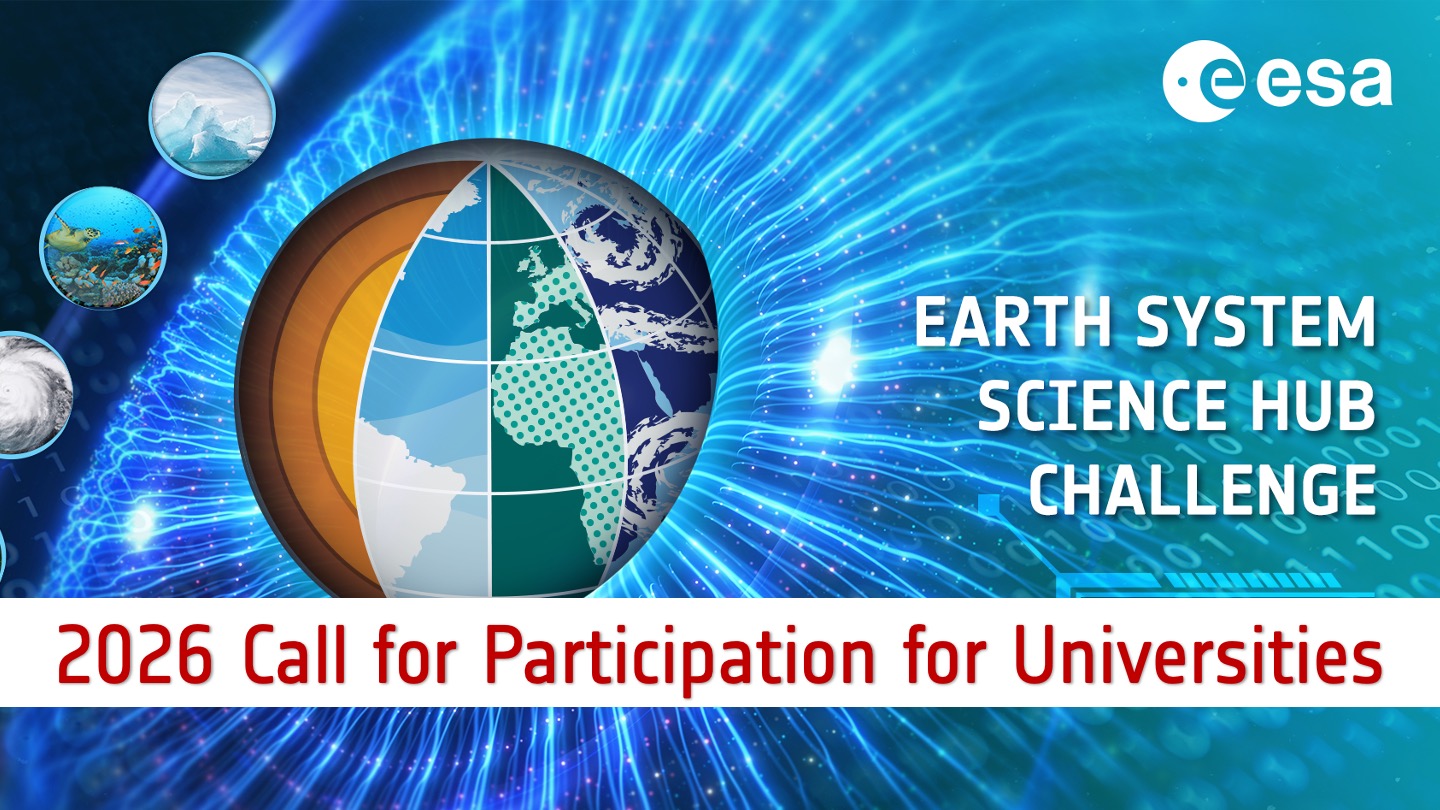
2026 Call for Participation for Universities: Science Hub Challenges
- Post by: Science Hub Team
- July 30, 2025
- Location: ESRIN, Frascati, Italy
- Dates: 2026
- Application Deadline:
30 September 2025extended to 24 October 2025
The European Space Agency (ESA) invites universities offering Master’s or PhD programmes in Earth Observation (EO), Environmental Science, Remote Sensing, or related fields to apply for participation in the Science Challenges 2026 workshop.
This one-week event, held at ESA’s ESRIN facility, offers students a unique opportunity to engage directly with ESA experts, access cutting-edge EO data and tools, and showcase their work on an international stage.
Workshop Benefits
Selected participants will have the opportunity to:
- Spend one week immersed in the ESA Earth Observation environment at ESRIN.
- Engage with EO Mission Managers and leading scientists at the ESA Science Hub.
- Receive hands-on training with ESA and third-party EO data on cloud platforms such as DeepESDL,openEO, or MAAP, with full expert support.
- Benefit from up to 1 year of sponsored cloud computing access via ESA’s Network of Resources (NoR).
- Visit the Phi Experience and Phi-lab, experiencing the forefront of EO innovation.
- Have a chance to have their projects featured on the ESA-NASA-JAXA Earth Observation Dashboard, reaching a global audience.
Workshop Structure
The workshop is designed to provide a balanced mix of expert-led sessions and practical project work:
- 40% – Expert lectures, meetings, and site visits (Phi-lab, Phi Experience).
- 60% – Team-based project work (2–3 students per team) using Python and ESA-provided cloud computing resources and data.
Projects will use multivariate EO datasets, supported by continuous expert guidance. Access to the platforms will be sponsored by ESA.
Eligibility and Application Requirements
Universities may propose a group of students (max. 16 participants) who:
- Are enrolled in relevant Master’s or PhD programmes.
- Have strong Python programming skills.
- Can work independently and collaboratively in small teams.
Each group must be accompanied by 1–2 university staff, actively involved in defining the challenges and supporting student projects.
How to Apply
To apply, universities should submit a single PDF (max. 4 pages) including:
- Proposed Science Challenges
- Up to 3 challenges, each maximum half-page.
- Must be solvable within 2 working days.
- Structure:
- Science question
- Societal relevance
- EO datasets to be used
- Method
Note: The final challenges will be defined in collaboration with ESA and the workshop science team, ensuring they meet the objectives of the event and leverage available resources.
- Student Details
- Names, affiliations, study discipline, level of study, and evidence of Python skills.
- Logistics
- Confirmation that the university will cover students’ travel and subsistence costs. Universities are expected to cover all the travel and subsistence costs for their students and accompanying staff. ESA will provide on-site training, facilities, and expert guidance at no additional cost.
- Accompanying Staff
- Names and roles of 1–2 staff who will accompany and support the student group. Accompanying staff shall be responsible for the group during their visit at ESRIN. The accompanying staff shall be actively involved in the definition of the challenges, and shall support the students in the implementation of their projects.
Proposal Submission
Submit your proposal as a single PDF file to ScienceHub@esa.int by 24 October 2025. Proposals should not exceed 4 pages.
Selection Criteria
ESA will organise up to 2 Workshops in 2026. Proposals will be evaluated based on the following:
1. Relevance and feasibility of proposed challenges (40%)
- Is the scientific question relevant?
- Is the challenge feasible to be solved within the workshop timeframe?
- Is the solution using ESA data?
2. Student capacity and engagement (30%)
- Are the students well-prepared to work in a Python-based environment?
- Do they have the necessary skills to complete a project in teams of 2-3 within two days?
3. Impact on University Programme (20%)
- Does the proposal demonstrate how this participation could benefit the university to enhance its participation to ESA programmes or improve their educational programme?
4. Logistical feasibility (10%)
- Can the university provide clear logistical support, including funding for student travel and accommodation, and accompanying staff?
Further Information
For questions or further details, please contact: ScienceHub@esa.int.
Previous workshop editions:

